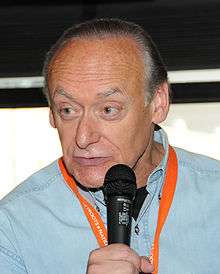Lee Fisher
Lee Irwin Fisher (born August 7, 1951) is an American lawyer, law dean and professor, former non-profit executive, and former Ohio statewide public officeholder. A member of the Democratic Party, he served as the 64th Lieutenant Governor of Ohio, with Governor Ted Strickland, from 2007 until 2011. He serves as the Dean of Cleveland–Marshall College of Law at Cleveland State University. He is also the Joseph Hostetler -BakerHostetler Chair in Law.
Lee Fisher | |
|---|---|
 | |
| Dean of Cleveland–Marshall College of Law | |
| Assumed office May 2017 | |
| 64th Lieutenant Governor of Ohio | |
| In office January 8, 2007 – January 10, 2011 | |
| Governor | Ted Strickland |
| Preceded by | Bruce Johnson |
| Succeeded by | Mary Taylor |
| 44th Attorney General of Ohio | |
| In office January 14, 1991 – January 9, 1995 | |
| Governor | George Voinovich |
| Preceded by | Tony Celebrezze |
| Succeeded by | Betty Montgomery |
| Member of the Ohio Senate from the 25th district | |
| In office January 3, 1983 – December 31, 1990 | |
| Preceded by | Paul Matia |
| Succeeded by | Eric Fingerhut |
| Member of the Ohio House of Representatives from the 16th district | |
| In office January 3, 1981 – December 31, 1982 | |
| Preceded by | Harry Lehman |
| Succeeded by | Judy Sheerer |
| Personal details | |
| Born | August 7, 1951 Ann Arbor, Michigan, U.S. |
| Political party | Democratic |
| Spouse(s) | Peggy Zone |
| Alma mater | Oberlin College Case Western Reserve University |
He is Senior Fellow, Cleveland State University's Levin College of Urban Affairs; and Urban Scholar, College of Urban Planning and Public Affairs and the Great Cities Institute, University of Illinois at Chicago. He is a member of the Cleveland Community Police Commission (appointed by Cleveland Mayor Frank Jackson), the Cleveland Group Plan Commission (appointed by County Executive Armond Budish), the Board of the Cleveland Metropolitan Bar Association, and Co-Chair (with former Ohio Governor Bob Taft), of the Ohio Advisory Council, U.S. Global Leadership Coalition.
Before his election as lieutenant governor, Fisher served as a member of the Ohio General Assembly, first in the Ohio House of Representatives (1981–1982) and then in the Ohio Senate (1982–1990). He was Attorney General of Ohio from 1991 to 1995 and the Democratic nominee for Governor of Ohio in 1998, losing to Republican Bob Taft.
From 1999 to 2006, he served as President and CEO of the Center for Families and Children (CFC) in Cleveland. CFC is a $20 million human services nonprofit with over 300 staff. In 2001 he graduated from the Center for Creative Leadership's "Leadership at the Peak" program. In January 2006, then-Congressman Ted Strickland asked Fisher to be his running mate in the 2006 gubernatorial election. Fisher left CFC on March 1, 2006, to run with Strickland. The two were elected. As Lieutenant Governor, he also served as the Director of the Ohio Department of Development and Chair of both the Ohio Third Frontier Commission and the Clean Ohio Council.
Fisher did not run for re-election in 2010, instead running for the U.S. Senate. He won the Democratic primary for the seat held by the retiring Republican George Voinovich, losing to Republican nominee Rob Portman.
He was announced to be the new CEO and President of CEOs for Cities in May 2011.[1] In 2016, Fisher was appointed Interim Dean of Cleveland State University's Cleveland–Marshall College of Law for the 2016–17 academic year. On May 3, 2017, Fisher was named permanent Dean after a national search.
Life and career
Fisher graduated from Oberlin College in 1973 (later serving on the board of trustees for 12 years) and Case Western Reserve University School of Law in 1976 (later receiving the first Distinguished Recent Graduate Award in 1984, and inducted into the Law School's Society of Benchers in 2009). He graduated from the Case Western Reserve University Weatherhead School of Management's Professional Fellows Program in 1996. In 2004, he received his master's degree in Nonprofit Organization from the Case Western Reserve University Mandel Center for Nonprofit Organizations.
After graduation from law school, he was a law clerk for Judge Paul C. Weick of the U.S. Court of Appeals for the Sixth Circuit (1976–1977). In 1978, he joined the Cleveland law firm of Hahn Loeser & Parks LLP, and was an instructor in Legal Research, Writing, and Advocacy at Cleveland State University Cleveland-Marshall College of Law during the 1978 school year. During his 10 years in the state legislature, he continued to serve as of counsel to the law firm (1978–1990). He rejoined Hahn Loeser & Parks as a partner in 1995 and served as a partner until he was selected CEO of the Center for Families and Children in 1999.
At the age of 29, Fisher was elected to the Ohio House of Representatives in 1980. He served as a state representative for two years before being elected to the Ohio Senate in 1982. He was named " Outstanding Freshman Legislator" by Columbus Monthly magazine in 1982. He served as a state senator for eight years. In 1983 he was named a Chase Public Leadership Fellow and attended the Harvard Program for Senior Executives in State and Local Government.
Fisher was elected Attorney General of Ohio in 1990, defeating Paul Pfeifer in the only statewide election in Ohio history to trigger a statewide recount.[2] In 1992, Fisher was elected a presidential elector for Ohio.[3] Fisher served as attorney general from 1991 to 1995, narrowly losing his bid for re-election in 1994 to Republican Betty Montgomery.
In 1998, Fisher ran for governor but lost to Republican Bob Taft, 50%–45%, in the closest gubernatorial election in 28 years.
Joining the ticket of Democratic gubernatorial candidate Ted Strickland, Fisher was elected lieutenant governor in 2006.[4] The Ohio gubernatorial campaign was captured in the documentary film Swing State, which was directed by (his son) Jason Zone-Fisher, John Intrater, and H. Spencer Young.
He has served on two public company boards: Rex Stores (now Rex American Resources) and Office Max (before it was sold to Boise Cascade).
He is married to Peggy Zone Fisher, President/CEO of the Diversity Center of Northeast Ohio. He has two adult children, Jason and Jessica, and many nieces and nephews.
2010 U.S. Senate campaign
In February 2009, Fisher announced his campaign to replace George Voinovich in the U.S. Senate.[5]
On May 4, 2010, Fisher won the Democratic primary for the U.S. Senate, defeating Ohio Secretary of State Jennifer Brunner.[6]
In the general election on November 2, 2010, Fisher faced the Republican nominee, Rob Portman, a former Cincinnati congressman and Bush administration official.[6] Portman received 57% of the votes to Fisher's 39%. Fisher carried only six of Ohio's 88 counties and three of 18 congressional districts.[7]
Dean of Cleveland-Marshall College of Law
In 2016, Fisher was appointed Interim Dean of Cleveland State University's Cleveland–Marshall College of Law for the 2016–17 academic year. On May 3, 2017, Fisher was named permanent Dean after a national search. His selection was somewhat unconventional as the search committee opted for someone without a history in academia.
During his time as Dean, Fisher has focused on a number of initiatives. These have included a focus on leadership in the law, establishing the Cleveland-Marshall Hall of Fame, increased fundraising, and raising the school's national profile. Beginning in the fall of 2018, Fisher began teaching a course on leadership. That same year, the CM-Law P. Kelly Tompkins Leadership and Law Program was established. Named after P. Kelly Tompkins, a benefactor and 1981 graduate, the program places an emphasis on leadership as a necessary component of law.[8]
In the fall of 2017, Fisher led the effort in establishing the Cleveland-Marshall Hall of Fame. The now-annual fundraiser honors members of the CM-Law community who have had a positive impact on the school either through their reputation or as benefactors. Honorees include Ohio Supreme Court Chief Justice Maureen O'Connor, Congresswoman Marcia Fudge, and former Cleveland Mayor Carl B. Stokes among others. In addition to notable alum, the CM-Law Hall of Fame also highlights those who have been benefactors that have not graduated from the school including federal Judge Dan Polster and Judy and Robert H. Rawson, Jr. [9]
Electoral history
| Election results | ||||||||||||||||||||||||||||
|---|---|---|---|---|---|---|---|---|---|---|---|---|---|---|---|---|---|---|---|---|---|---|---|---|---|---|---|---|
| Year | Office | Election | Subject | Party | Votes | % | Opponent | Party | Votes | % | Opponent | Party | Votes | % | Opponent | Party | Votes | % | Opponent | Party | Votes | % | ||||||
| 1980 | State House | General | Lee Fisher | Democratic | ? | ? | Kent Minshall | Republican Party | ? | ? | ||||||||||||||||||
| 1982 | State Senate | General | Lee Fisher | Democratic | ? | ? | Ben Skall | Republican Party | ? | ? | ||||||||||||||||||
| 1986 | State Senate | General | Lee Fisher | Democratic | ? | ? | Unopposed in primary and general elections | ? | ? | ? | ||||||||||||||||||
| 1990 | Attorney General | Primary | Lee Fisher | Democratic | 394,332 | 62% | Charles T. Brown | Democratic | 246,729 | 38% | ||||||||||||||||||
| 1990 | Attorney General | General | Lee Fisher | Democratic | 1,680,698 | 50% | Paul E. Pfeifer | Republican | 1,679,464 | 50% | ||||||||||||||||||
| 1994 | Attorney General | Primary | Lee Fisher | Democratic | 739,724 | 100% | ||||||||||||||||||||||
| 1994 | Attorney General | General | Lee Fisher | Democratic | 1,625,247 | 49% | Betty Montgomery | Republican | 1,716,451 | 51% | ||||||||||||||||||
| 1998 | Governor | Primary | Lee Fisher | Democratic | 663,832 | 100% | ||||||||||||||||||||||
| 1998 | Governor | General | Lee Fisher | Democratic | 1,498,956 | 45% | Bob Taft | Republican | 1,678,721 | 50% | John Mitchel | Reform | 111,468 | 3% | Zanna Feitler | Independent | 65,068 | 2% | ||||||||||
| 2006 | Lieutenant Governor | General | Lee Fisher | Democratic | 2,435,505 | 61% | Thomas A. Raga | Republican | 1,474,331 | 37% | Mark Noble | Libertarian | 71,473 | 2% | Anita Rios | Green | 40,967 | 1% | * | |||||||||
| 2010 | U.S. Senator | Primary | Lee Fisher | Democratic | 380,189 | 56% | Jennifer Brunner | Democratic | 304,026 | 44% | ||||||||||||||||||
| 2010 | U.S. Senator | General | Lee Fisher | Democratic | 1,448,092 | 39% | Rob Portman | Republican | 2,125,810 | 57.25% | Eric Deaton | Constitution | 64,017 | 1.72% | Michael Pryce | Independent | 48,653 | 1.31% | Dan La Botz | Socialist | 25,368 | 0.68% | ||||||
References
- http://www.ceosforcities.org/about/staff/
- hosted.ap.org
- "Presidential Electors: November 3, 1992 - Ohio Secretary of State". www.sos.state.oh.us. Retrieved March 2, 2019.
- Strickland names Lee Fisher as running mate in governor's race. Business Courier of Cincinnati. January 26, 2006.
- Naymik, Mark. Lt. Gov. Lee Fisher joins the race for U.S. Senate seat, The Plain Dealer, February 17, 2009
- Naymik, Mark. Lt. Gov. Lee Fisher raises another $550,000 for Senate campaign, starts spending it on commercials. The Plain Dealer. April 14, 2010.
- http://www.rollcall.com/issues/56_97/-204148-1.html
- https://www.law.csuohio.edu/academics/leadership
- https://www.law.csuohio.edu/alumnigiving/hof/members
External links
- Ohio Lt. Governor Lee Fisher official government site
- Lee Fisher for U.S. Senate official campaign site
- Profile at Vote Smart
- Financial information (federal office) at the Federal Election Commission
- 1996, 1998 campaign contributions at the National Institute for Money in State Politics (Attorney General, Governor)
- 2010 campaign contributions at OpenSecrets.org


